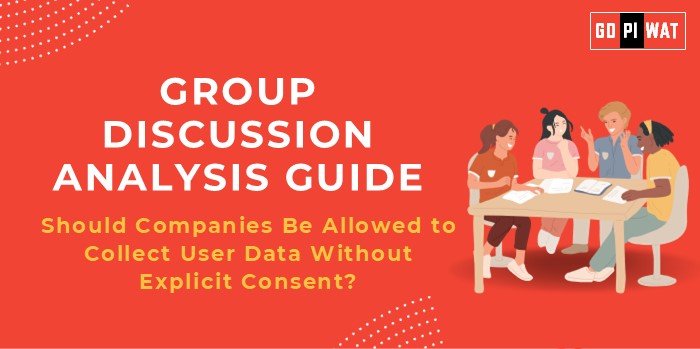📋 Group Discussion (GD) Analysis Guide: Should Companies Be Allowed to Collect User Data Without Explicit Consent?
🌐 Introduction to the Topic
Opening Context:
“In a world where data is often dubbed the ‘new oil,’ the practice of collecting user data without explicit consent stirs debates on ethics, privacy, and corporate responsibility.”
Topic Background:
This topic delves into the ethical, legal, and societal implications of corporate data practices. The debate has intensified with rising data breaches, stricter privacy laws, and growing consumer awareness.
📊 Quick Facts and Key Statistics
- 🌍 Global Data Privacy Laws: Over 120 countries have enacted data protection laws; GDPR (EU) fines surpassed €4 billion since 2018.
- 📊 Consumer Sentiment: 81% of global consumers feel they have little control over their data (Pew Research, 2023).
- 💰 Economic Impact: Big Tech earns 30%-50% of revenue from data-driven advertising.
- 🔓 Data Breaches: 22 billion records exposed worldwide in 2022, emphasizing risks.
🧩 Stakeholders and Their Roles
- 🏛️ Governments: Formulate data protection laws, enforce compliance, and uphold citizens’ rights.
- 💼 Corporations: Innovate responsibly, implement secure data handling practices, and maintain transparency.
- 👤 Consumers: Demand accountability, monitor their digital footprint, and adapt to privacy tools.
- 📢 Advocacy Groups: Push for stringent regulations and raise public awareness.
🏆 Achievements and Challenges
✨ Achievements:
- 📜 Transparency Reforms: Laws like GDPR and CCPA have increased accountability.
- 🔒 Advancements in Anonymization: Techniques to secure data have improved.
- 🌟 Privacy-Focused Startups: Growth in companies offering privacy-first solutions.
⚠️ Challenges:
- ⚙️ Ambiguity in Consent Mechanisms: Practices like pre-ticked boxes can mislead users.
- 🔓 Rising Cybercrime: Ransomware costs surged to $30 billion globally in 2023.
- 📚 Limited Literacy: Data protection knowledge gaps persist in developing economies.
🌎 Global Comparisons:
- 🇪🇺 Success: EU’s GDPR is a gold standard for user rights.
- 🇺🇸 Challenges: U.S. lacks a federal privacy law, creating inconsistencies.
Case Study: India’s Digital Personal Data Protection Act (2023) focuses on purpose limitation and accountability but grapples with enforcement gaps.
💬 Structured Arguments for Discussion
- Supporting Stance: “Data collection without explicit consent enables innovation and personalized experiences.”
- Opposing Stance: “Such practices undermine privacy and risk exploitation.”
- Balanced Perspective: “A middle ground involves anonymized data and opt-in models.”
📚 Effective Discussion Approaches
Opening Approaches:
- 📊 Statistical Impact: “With GDPR fines surpassing €4 billion, how can companies ethically handle data?”
- ⚖️ Highlight a Scandal: “The Facebook-Cambridge Analytica incident shows the risks of unchecked data practices.”
Counter-Argument Handling:
- 💡 Recognize the merits of data-driven innovation but stress ethical boundaries.
- 📜 Suggest stronger frameworks like informed consent standards.
📈 Strategic Analysis of Strengths and Weaknesses
- ✔️ Strengths: Drives targeted marketing, AI advancements, and service improvements.
- ❌ Weaknesses: Invades privacy, enables surveillance capitalism, and breaches trust.
- 💡 Opportunities: Ethical AI, blockchain for secure transactions, global regulatory frameworks.
- ⚠️ Threats: Cybersecurity risks, public backlash, and potential over-regulation.
🏫 Connecting with B-School Applications
Real-World Applications:
- 🌟 Ethical leadership and privacy-compliant business strategies.
- 📖 Case studies on corporate social responsibility (CSR) and data ethics.
Sample Interview Questions:
- ❓ “How should businesses balance innovation with privacy?”
- ❓ “What role do ethics play in big data management?”
Insights for B-School Students:
- 💼 Develop frameworks for ethical decision-making in data management.
- 🔍 Explore intersections of technology and law for innovative privacy solutions.


